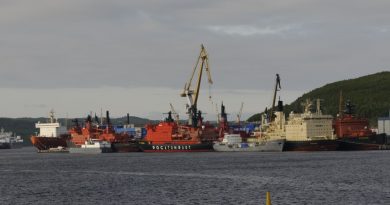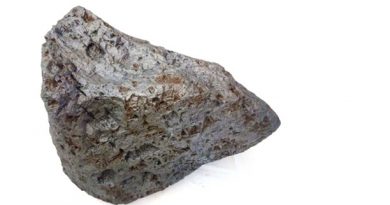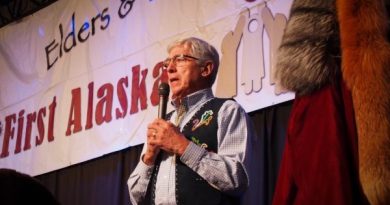Greenland losing ice faster this century than any previous one in last 12,000 years, says study

Researchers say findings reaffirm need for humans to curb greenhouse gas emissions
Humans have to slow down greenhouse gas emissions if they want to curb Greenland’s ice loss, a new study has found.
The research, published on Wednesday in the journal Nature, says the rate of the ice loss in Greenland this century will likely outpace that of any other century over the past 12,000 years.
The largest pre-industrial rates of mass loss — up to 6,000 billion tonnes per century — occurred in the early Holocene epoch, according to the study, and it’s about equivalent to the rate of modern day ice loss this century, which is around 6,100 billion tonnes per century.
The ice loss could result in mass amounts of fresh water pouring into the oceans, which can disrupt sea currents.
Though the Arctic has seen natural dips over the centuries, this ice loss is unusual because it can be attributed largely to human activity, says the lead author of the study, Jason Briner. He’s a professor of geology in the University at Buffalo College of Arts and Sciences.
“The reason for this dramatic ice loss this century is all the warmth in the Arctic, which is warming a lot faster than the globe on average. And that seems to be the case because of greenhouse gases in our atmosphere,” Briner said.
Reconstructing from the past
The study was a collaborative effort by climate modellers, ice core scientists, remote sensing experts and paleoclimate researchers at various institutions.
A team of geologists reconstructed the size of the Greenland ice sheet in the past, while another studied the climate history of Greenland, including its temperature and precipitation history. A third team used computers to simulate how the Greenland ice sheet evolves through time.
Together, the researchers were able to build a unique simulation of the changes to the southwestern sector of the Greenland ice sheet from the beginning of the Holocene epoch thousands of years ago. It also looked forward 80 years to the year 2100.
Briner says while it was mainly agreed that Greenland is entering a time of extreme change and dramatic ice loss, what motivated the study was the lack of historical context.
“Our entire community of ice sheet scientists and paleoclimatologists didn’t have a longer-term context for that rate of ice loss,” Briner said.
The study was largely funded by the US National Science Foundation.
Study consistent with previous findings
While the study’s projections only go to 2100, Briner says all evidence available tells us that unless there’s a concerted effort to suck carbon out of the atmosphere, and humans do better with carbon emissions, there will be “a lot of warming that’s going to take place this century.”
There have been several studies of recent ice loss that line up with the research.
A study published in April 2019 showed that Earth’s glaciers are losing 335 billion tonnes of snow and ice each year and in August 2019, Greenland recorded the most ice melt, about 11.3 billion tonnes, in a single day since recording began in the 1950s.
A more recent study published in late August showed that Greenland lost a record amount of ice during 2019 — the melt was massive enough to cover California in more than 1.25 metres of water.
Briner calls the findings of his team’s study a wake-up call, especially for countries like the United States, where Americans use more energy per person than people in any other nation in the world.
There is some hope, according to Briner.
He says if humans can achieve net zero carbon by 2100, then the Greenland ice sheet’s rate of mass loss could be “quite low.”
“So our action now is certainly going to affect the rate of ice mass loss from Greenland,” Briner said.
Warming and sea level rise
Martin Sharp, a glaciologist who was not a researcher in this study, says while the research adds breadth to the range of possible scenarios, the findings are consistent with similar research.
Sharp is a professor in the Department of Earth and Atmospheric Sciences University Campus at the University of Alberta. He says whether the world will get to net-zero carbon by the end of the century comes down to politics.
“Do I have any faith that the global leadership will do anything that will lessen the risk of what [the researchers] are proposing? No, I don’t,” Sharp said, adding it’s possible that could change with different leaders.
Sharp says it’s important to focus on the “fundamental point,” which is that a significant amount of warming and sea level rise over the next century can be expected.
“It would be a good idea to start preparing ourselves for those realities and how they will change the way we have to behave as a society.”
Related stories from around the North:
Canada: What the Arctic’s transition to a ‘new climate’ looks like, CBC News
Greenland: A big chunk of Greenland’s ice cap breaks off as Arctic shifts to new climate regime, The Associated Press
Finland: Miners hunting for metals to battery cars threaten Finland’s Sámi reindeer herders’ homeland, Yle News
Iceland: Arctic Science Ministerial postponed to 2021 due to COVID-19, Eye on the Arctic
Norway: Climate change hits back at Svalbard, coal mine flooded by melting glacier in Norway, The Independent Barents Observer
Russia: Record-warm Arctic summer fatal to wild reindeer in Russia, say environmentalists, The Independent Barents Observer
Sweden: Extra billions to SAS – but with stricter climate requirements, Radio Sweden
United States: Bering Sea ice at lowest extent in at least 5,500 years, study says, Alaska Public Media



